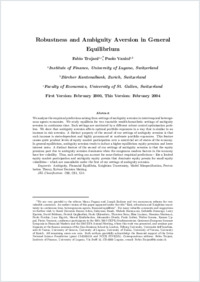Robustness and ambiguity aversion in general equilibrium
- Trojani, Fabio Istituto di finanza (IFin), Facoltà di scienze economiche, Università della Svizzera italiana, Svizzera
- Vanini, Paolo Istituto di finanza (IFin), Facoltà di scienze economiche, Università della Svizzera italiana, Svizzera
-
2004
Published in:
- Review of Finance. - Springer Netherlands. - 2004, vol. 8, no. 2, p. 279-324
Ambiguity
financial equilibria
knightian uncertainty
model misspecification
perturbation theory
robust decision making
English
We analyze the empirical predictions arising from settings of ambiguity aversion in intertemporal heterogenous agents economies. We study equilibria for two tractable wealth-homothetic settings of ambiguity aversion in continuous time. Such settings are motivated by a different robust control optimization problem. We show that ambiguity aversion affects optimal portfolio exposures in a way that is similar to an increase in risk aversion. A distinct property of the second of our settings of ambiguity aversion is that such increase is state-dependent and highly pronounced at moderate portfolio exposures. This feature causes quite prudent levels of equity market participation over a nontrivial set of states of the economy. In general equilibrium, ambiguity aversion tends to induce a higher equilibrium equity premium and lower interest rates. A distinct feature of the second of our settings of ambiguity aversion is that the equity premium part due to ambiguity aversion dominates when the exogenous random factors in the economy have low volatility. Thus, such setting can account for some distinct empirical predictions - like a limited equity market participation and ambiguity equity premia that dominate equity premia for small equity volatilities - which are unavailable under the first of our settings of ambiguity aversion.
- Language
-
- English
- Classification
- Economics
- License
-
License undefined
- Open access status
- green
- Identifiers
-
- RERO DOC 6517
- DOI 10.1023/B:EUFI.0000035193.29969.40
- ARK ark:/12658/srd1317919
- Persistent URL
- https://n2t.net/ark:/12658/srd1317919
Statistics
Document views: 211
File downloads:
- Texte intégral: 309
